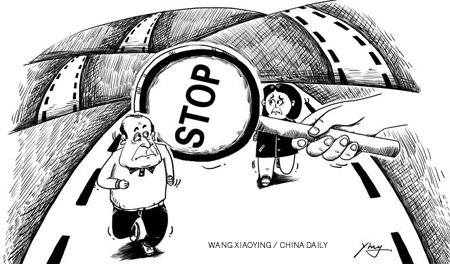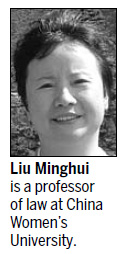View
Same retirement age for all
Updated: 2011-03-24 07:58
By Gao Zhuyuan (China Daily)
|
|
The retirement age, rather whether it should be raised or not, has sparked a public debate in these times of aging population. The decision of the Ministry of Human Resources and Social Security that it would consider raising the retirement age for women seems to have intensified the debate.
The official retirement age for men, according to 1978 regulations, is 60. Ordinary woman workers retire at 50, and woman cadres at 55.
About 91 percent of the nearly 1.47 million people who responded to an online survey on Qq.com last year said the retirement age should not be raised. Many people even say that early retirement benefits women.
But regulations on retirement were implemented when China launched its reform and opening-up, and when labor-intensive industries were expected to, and did, drive the economy. And since men have certain physical advantages over women, they were regulated to retire at a later age. Also, the family planning policy was yet to be implemented in the late 1970s, and women had more parental and other responsibilities because a normal family then had several children.
The times and role of women, however, have changed drastically in the past three decades, and so too must the regulations, says Liu Minghui, a professor of law at China Women's University. "Women (in the 1970s) were less educated and many of them started working at an early age and had to endure a tough working life," so early retirement came as a relief for them. Plus, we should not forget that the average life expectancy in the 1970s was just about 60 years.
Today, the average life expectancy in China is 71 for men and 74 for women (according to World Health Organization's data for 2007). Apart from living longer than men, women today are also better educated, says Liu, who specializes in labor law and works as part-time lawyer to provide legal and other help to working women.
Generally speaking, a woman in her 50s today is at the prime of her career and relatively free of parental duties because her single son/daughter is expected to have grown up by then. Thanks to the experience she would have gathered, a woman in her 50s is qualified enough and ready to take up greater responsibilities. But she cannot, because she has to retire.
Liu, who is in her mid-50s, criticizes the gender bias in the regulations. It is "outdated, causes huge financial loss to women and blocks their career path". People opposed to lifting women's retirement age do not see the financial loss they suffer. One of Liu's clients - an accountant with a Shanghai-based media outlet - says she will lose about 963,000 yuan ($147,000) if she retires at 50 instead of 55. The accountant is right because "pension today is paid according to the local wage level", Liu says.
"Earlier, household incomes used to be humble and comprised only wages," but they have risen drastically over the past three decades, and in recent years, labor authorities at different levels have raised salary levels further. "Employees now have access to other sources of income, including subsidies and bonus, too." The average pay is significantly higher today. According to the Beijing municipal bureau of labor and social security, for instance, the city's average wage rose from 28,348 yuan a year in 2004 to 48,444 yuan in 2009.
So a Beijing-based woman who retired in 2005, would get a pension according to the average wage of 2004, and one who retired in 2010, would be paid at the 2009 level. Now imagine the loss the woman who retired in 2005 suffers.
"Pension is also closely related with the number of years a person puts in his/her job," Liu says. This means the longer a person works, the higher basic pension he/she gets. Women who go in for higher studies start working only in their late 20s or early 30s. Yet they have to retire five to 10 years before men, which reduces their years in service and thus increases their financial loss.
Apart from money, early retirement also deprives women, especially public servants, from participating in politics. Liu has mentioned this in a written proposal to the State Council Legislative Affairs Office and the Ministry of Human Resources and Social Security. Early retirement age deprives women of promotion, too. "And retiring five to 10 years before men, to a certain extent, compromises women's rights to further participate in State administration and public affairs."
These discrepancies are more than enough to warrant a change in retirement regulations.
Besides, many women employed in cadre-designated jobs have been forced to retire at 50 because their service records identified them as workers. Such women want the division between female cadres and female workers to be fixed, Liu says.
But women doing heavily physical work are against the idea, which is understandable given the nature of work they do. Increasing the retirement age would not be beneficial to women who are laid off midway through their career, too. Suppose a female worker is laid off at the age of 45 now, she has to pay the "social security fee" for another five years to qualify as a pensioner. But if the retirement age is raised to 60, and a female worker is laid off at 45, she has to pay the "social security fee" for another 15 years to get pension. That definitely will compound a female worker's financial problems.
Therefore, the authorities should consider the interests of women as a whole as well as the differences between female cadres and female workers, instead of making sweeping changes in regulations for female cadres and female workers. This, too, is part of Liu's proposal to the ministry and the Legislative Affairs Office.
The division between female cadres and female workers should be removed by a job-based classification. And men and women should enjoy the same working rights and both should retire at 60.
Moreover, the authorities should introduce a flexible range for retirement to serve the interest of different working groups. For instance, some groups such as public servants should be allowed to defer their retirement age till 65 if their job demands so, but they should be allowed to retire earlier, too. People doing heavy physical work should definitely be given the right to retire early. And women should have the right to decide whether to retire early or postpone their retirement. In case of manual workers and women, the decision should be free of employers' interference.

Specials

'Super moon'
The "Super Moon" arrives at its closest point to the Earth in 2011.

Radiation test
The probability of being exposed to a life-threatening level of radiation is quite slim.

Panic buying of salt
Worried Chinese shoppers stripped stores of salt on radiation fears.
